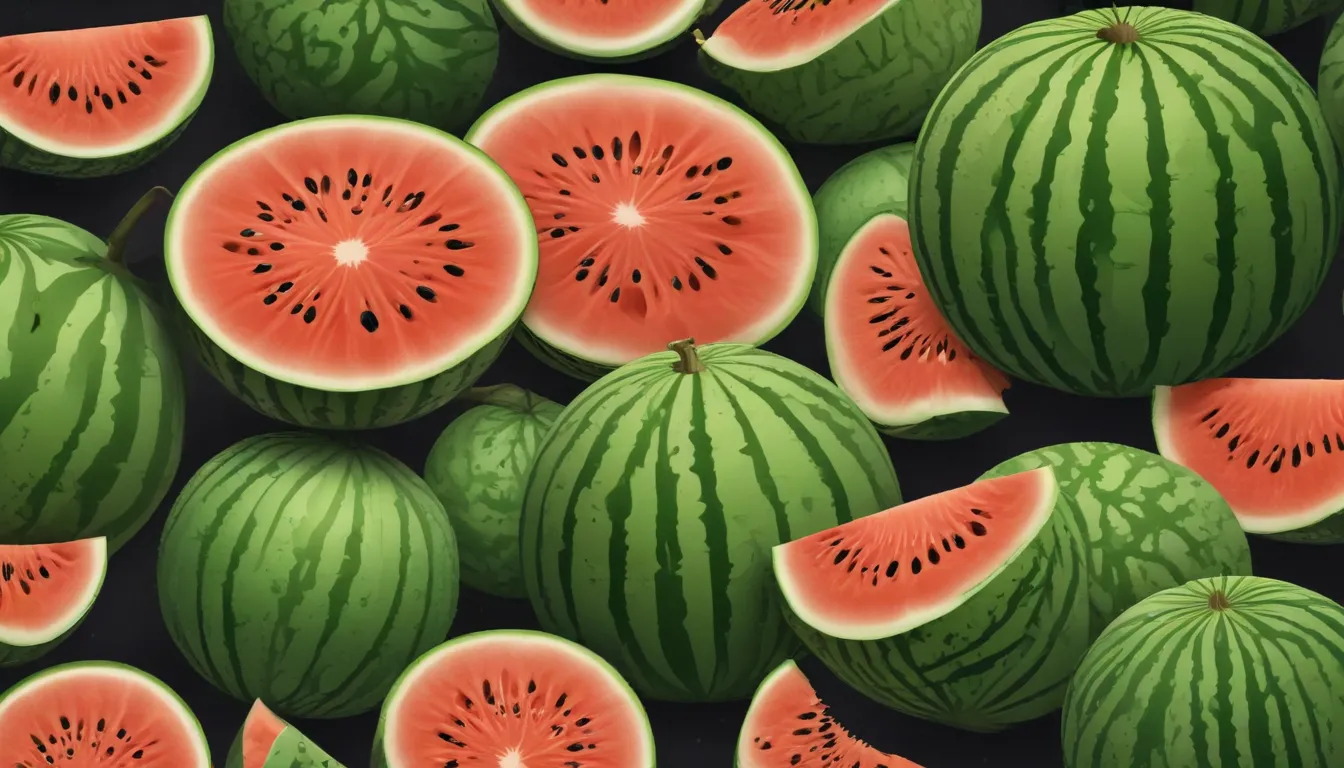The pictures in our articles might not always show exactly what the text is talking about. We use these images to make the article more interesting and eye-catching. They are there to add to the text, but not to replace it or show every detail.
Introduction:
Melons are more than just a refreshing summertime snack - they are a treasure trove of interesting facts waiting to be explored! From their rich history to their diverse flavors and health benefits, melons have captured the hearts and taste buds of people worldwide. Whether you're a melon enthusiast or simply curious about these juicy fruits, get ready to uncover the secrets and surprising facts behind your favorite melons!
The Versatile Cucurbitaceae Family
- Melons belong to the Cucurbitaceae family: Did you know that melons are closely related to cucumbers, pumpkins, and squash? They all share the common traits of delicious flesh and high water content.
Variety is the Spice of Melons
- Over 400 varieties of melon: From the sweet Cantaloupe to the crisp Watermelon, melons come in a wide array of shapes, sizes, and flavors, offering something for every palate.
Nutrient-Packed Powerhouses
- Packed with essential nutrients: Melons are a fantastic source of vitamins A and C, potassium, and dietary fiber, making them a healthy choice for boosting your immune system.
A Rich History of Appreciation
- Ancient Egyptians prized melons: Melons have been cherished for over 4,000 years, with the Egyptians even considering them sacred and incorporating them into their burial rituals.
The Reign of Watermelons
- Watermelons are the most popular melon: Loved for their refreshing taste and hydrating properties, watermelons hold the crown as the most popular melon globally.
Hydration and Refreshment in Every Bite
- High water content: With an average water content of around 90%, melons are an excellent choice for staying hydrated, particularly during hot summer days.
A Hidden Delight: Melon Seeds
- Edible melon seeds: Don't discard those melon seeds! They can be roasted for a tasty snack or used in various dishes, adding a nutritious crunch.
China: The Melon Production Powerhouse
- World's leading melon producer: With vast agricultural resources, China leads global melon production, supplying a significant portion of melons consumed worldwide.
Millennia of Cultivation
- Cultivated for over 4,000 years: Humans have been growing melons for millennia, with their origins in Africa before spreading to Asia and Europe.
A Summer Essential: Hydration Companion
- Hydration aid: Thanks to their high water content, melons are an ideal choice for quenching thirst and replenishing electrolytes on hot days or after physical exertion.
Vibrant Colors and Varied Hues
- Colorful diversity: While we often associate melons with orange and green shades, there are also varieties in yellow, white, and even black hues.
Sweetness Defined: The Honeydew Melon
- Sweet honeydew melons: Named for their honey-like flavor, these melons are perfect for enjoying fresh or adding a touch of sweetness to summer salads.
Gourd Family Connections
- Gourd family members: As part of the gourd family, melons share characteristics with other gourds like pumpkins, zucchinis, and cucumbers.
A Vegetable in Disguise
- Watermelons in Oklahoma: Despite being a fruit, watermelons are the official state vegetable of Oklahoma since 2007.
Longevity in Freshness
- Extended shelf life: Properly stored melons can last up to two weeks, allowing for prolonged enjoyment of these delectable fruits.
Antioxidant-Rich Goodness
- Antioxidant abundance: Melons boast vibrant colors due to antioxidants like lycopene and beta-carotene, offering various health benefits.
Seasonal Harvests
- Different harvest seasons: While some melons peak in summer, others like honeydews thrive in late summer and early fall for optimal flavor.
Conclusion:
Melons are truly a gift from nature, offering a delightful burst of flavor and nutrition. Whether you're savoring a slice of watermelon on a hot day or exploring the sweetness of a cantaloupe, these fruits have something for everyone. Remember these fascinating facts the next time you indulge in a juicy melon and appreciate the wonders of this beloved fruit.
FAQs:
- Are all melons sweet? While most melons are sweet, some like bitter melons have a more bitter taste.
- Are melons good for weight loss? Yes, melons are low in calories and high in water content, making them ideal for weight loss.
- What nutrients do melons contain? Melons are rich in essential vitamins and minerals, including vitamin C, vitamin A, potassium, and fiber.
- Can melons aid in hydration? Absolutely! With their high water content, melons are excellent for staying hydrated, especially in hot weather.
- How do I choose a ripe melon? Look for fragrant smell, heaviness for size, and slight give when pressed to choose a ripe melon.
- Can melons be frozen? Yes, cut them into chunks and remove seeds before freezing for best results.
- What are the different melon types? Varieties include watermelon, cantaloupe, honeydew, Korean melon, Persian melon, and more.
- Are melons rich in antioxidants? Yes, antioxidants in melons can protect against oxidative stress and promote overall health.
- How long do melons last? Depending on storage, melons can last up to a week in the refrigerator.
- Are melon seeds edible? Some melon seeds, like watermelon seeds, are edible and can be roasted for a tasty snack.
Melons are a versatile and delicious fruit that offers a myriad of benefits and flavors. Whether you're enjoying them fresh, frozen, or as part of a meal, melons are sure to add a burst of flavor and nutrition to your day. So, dive into the world of melons and explore the wonders of these delightful fruits!






